In this material, a disease called arterial hypertension will be considered. We will try to consider the symptoms and treatment of this ailment as more detail as possible.
Content
- Syndrome of arterial hypertension
- Illuminaric hypertension: causes
- Arterial hypertension in pregnant women
- Arterial hypertension in children
- Degree of arterial hypertension
- Stages of arterial hypertension
- Symptomatic arterial hypertension
- Secondary arterial hypertension
- Diagnosis of arterial hypertension
- Treatment of arterial hypertension
- Arterial hypertension: recommendations and prevention
- Video: What is arterial hypertension?
Syndrome of arterial hypertension
Arterial hypertension is a disease during which blood pressure rises. There are 2 types of hypertension: primary and symptomatic.
This disease is considered the most common. As a rule, a person begins to feel sluggish and needs qualified help. If therapy does not apply, severe complications may occur.
What are the factors of the appearance of the disease? What are the symptoms of the disease in all stages? Is it possible to prevent the occurrence of the disease? Arterial hypertension - what is it in general? You can find answers in our material to such questions. But first you need to find out what this disease is.
So, the functionality of the cardiovascular system is controlled using the nervous system and some hormones that are released due to endocrine glands. Normal diagnostic pressure of a person can fluctuate from 70 to 90, and systolic pressure - from 120 to 140. When these indicators increase, doctors diagnose the disease - arterial hypertension.
Illuminaric hypertension: causes
There are a lot of causes of arterial hypertension. Primary hypertension and secondary disease are divided due to etiology. The primary may appear on its own against the background of some factors. That is, for the following reasons:
- With age (in men, the disease occurs at about 55 years, but in the female half - at 65).
- Due to constant smoking.
- Due to regular experiences and stress.
- Due to a sedentary lifestyle.
- Due to excess weight.
- Sometimes the disease appears in people who suffer from diabetes.
- Can indulge in inheritance.
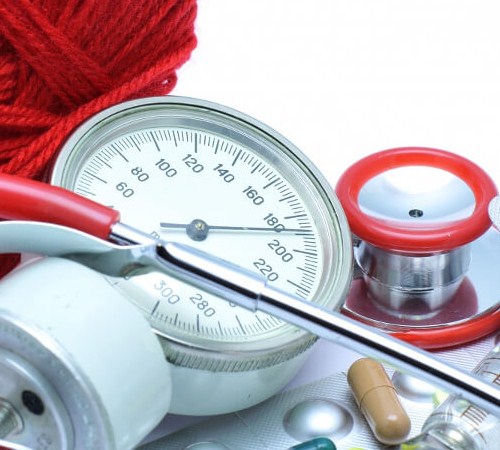
The second version of hypertension appears as a result of diseases that a person has. We list these diseases:
- Kidney disease.
- Endocrine malfunctions.
- Cardiovascular diseases.
- Diseases associated with toxic poisoning.
- Diseases caused by certain drugs.
Arterial hypertension in pregnant women
The common reason due to which the ailment occurs is pregnancy. This symptom is considered quite dangerous for both women and the fetus. This happens due to an increase in the load on the cardiovascular system. Due to this process, the volume of blood that circulates throughout the body also increases. As a rule, women from 20 to 25 years old complain about such a problem.

The first symptoms of hypertension in pregnant women are as follows:
- Flies often appear before your eyes.
- Pregnant is concerned about regular headaches.
- Red spots appear on the face.
- Greatly excitability increases.
- Vision drops sharply.
- Blood often protrudes from the nose.
- In some situations, pain in the chest arises, as well as pain that crushes on the heart.
Arterial hypertension in children
The ailment in children is not often found, but at the same time it is considered the most common disease that is found in pediatrics. According to studies, it became known that hypertension occurs in 18% of children. The disease is relevant due to the characteristics of therapy.
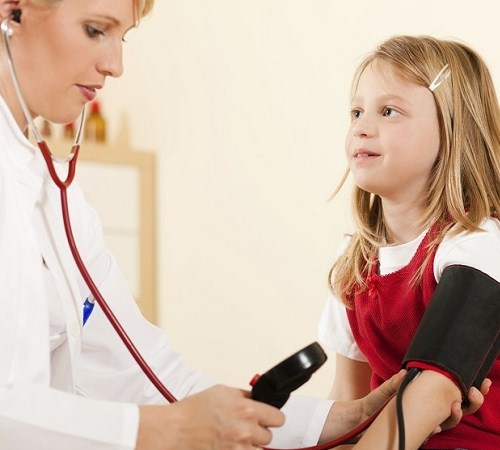
In addition, pathologies often occur, after which malignant arterial hypertension occurs in childhood. Today, every year the number of children with such a disease and causes can be increased.
- Due to the fact that the activity of the nervous system increases.
- Due to the use of infusion therapy after an renal disease or an excess of mineralcorticoids.
- Due to the high sensitivity of the soft tissue to catecholamine.
Also, a disease is often found in those children who have a high level of anxiety and due to acute, chronic stresses.
Degree of arterial hypertension
The disease can affect the degree and type of disease. In order to evaluate how affected by the organs, the degree of disease must be determined.
1 degree:
- There are no changes in the organs. This degree is softer. During it, blood pressure rises. This happens with a certain frequency, while its independent normalization also occurs.
- Pressure drops can be accompanied by weak heads of the head, insomnia, fatigue due to mental work.
2 degree:
This degree is considered "moderate". During it, there are objective changes that affect some organs.
- Coronary vessels and arteries are localized and narrowed.
- The left ventricle of the heart increases.
- There is renal failure that has a chronic form.
- The vessels of the eye retina are narrowed.
Remissions are not often manifested, as a rule, increased pressure is maintained.
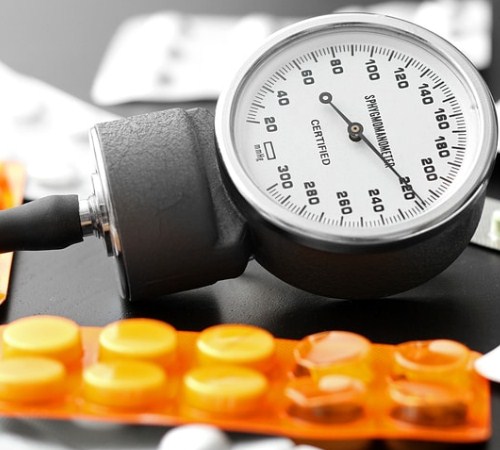
3 degree:
This degree is considered the most difficult. There is a violation of the blood supply to each organ, as a result of which the following manifestations of a clinical nature arise:
- Heart failure, angina pectoris, myocardial infarction, arterial blockage, aorta exfoliation.
- The optic disk swells, hemorrhage occurs.
- There are circulatory disorders in the brain, stroke, vascular dementia, hypertension encephalopathy.
Some manifestations described above can lead to death.
Stages of arterial hypertension
The degree of hypertension is data that allows you to classify the disease. In order to recover faster, it is necessary to detect reasons.
There are 3 stages of arterial hypertension. Consider them more detailed.
1st stage:
This degree of disease can be detected only if the blood pressure is regularly measured. Of course, the pressure must be measured in a calm state, at least 3 times in a certain time.
This degree is considered easy, as it is expressed non -core. In a patient with such a degree of disease, as a rule, pressure can fluctuate within such limits:
- Upper pressure - from 140 to 160.
- Lower pressure - from 90 to 100.
Stage 2:
This degree is considered average. The patient’s pressure can fluctuate in the following limits:
- Upper pressure - from 160 to 180.
- Lower pressure - from 100 to 110.
There are situations when the pressure increases with a specific method and unevenly. For example, only lower pressure increases during a visit to a doctor. At home, the pressure normalizes. This happens with those people who have an unstable or labile type of nervous system.
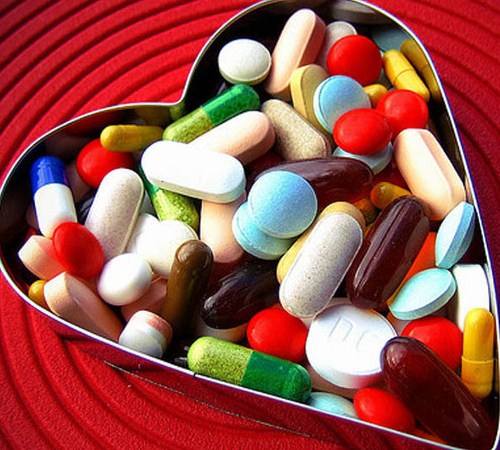
Stage 3:
This degree is the last and the most difficult. The patient’s pressure can fluctuate within such limits:
- The upper pressure is 180 or more.
- Lower pressure of at least 110.
There are situations when only the upper pressure rises. Such malfunctions are often observed in elderly people. 3 degrees hypertension are also called “increased pressure” of 4 degrees. This, of course, is wrong.
Symptomatic arterial hypertension
Doctors cannot say exactly why this disease appears for. But this form can be observed in almost all people who complain of high pressure.
Symptomatic arterial hypertension, in turn, is divided into the following forms:
- Hyperdrenergic. This form is found in almost 5 part of patients, and these patients are mostly young. The form appears due to the fact that the adrenaline is released into the blood. The symptoms are as follows: the skin tone changes, there is a pulse in the head, a patient with arterial hypertension is disturbed and greatly freezes.
- Hyporlenine. As a rule, it appears in the elderly. Doctors are recommended to abandon salt food and abundant use of liquid.
- Hyperrenic. This form occurs in those patients in whom the disease develops rapidly. The percentage of patients is approximately 20%. As a rule, these are young guys. The shape is difficult, sharp pressure drops occur. If it is not treated, it can cause the occurrence of atherosclerosis of the renal artery.
Secondary arterial hypertension
This variety also has a different name - “symptomatic hypertension”, since it affects systems and organs that are responsible for the functionality of blood pressure.
The reasons due to which the disease occurs is easy to detect. It is divided into some forms, it all depends on these reasons:
- Renovascular. The renal arteries narrow, blood circulation in both kidneys worsens. As a result, the buds begin to secrete substances that increase pressure. The patient feels quite normal, it can even work. Patients note that pressure drops are usually characterized by back pain. This form is difficult to cure. First, the primary disease is cured.
- Endocrine. It can appear in diseases of the endocrine system. During it, the patient begins to crash sharply or it increases greatly, vision is disturbed, the heartbeat worsens.
- Hemodynamic. Worries patients with the last stage of heart failure.
- Neurogenic. It affects the vessels of the brain, provokes the appearance of tumors.
- Medicinal. Many drugs taking regularly can negatively affect the body. As a result, arterial hypertension develops. To prevent this from happening, you need to refuse self -medication and carefully study the instructions for each medicine.
Diagnosis of arterial hypertension
In order to diagnose the disease, the patient is examined by the doctor:
- He listens to the noise of the heart rhythm using a stethoscope.
- It measures the size of the heart with palpation.
- Makes a cardiogram, thereby examining the functionality of the heart, evaluating its size.
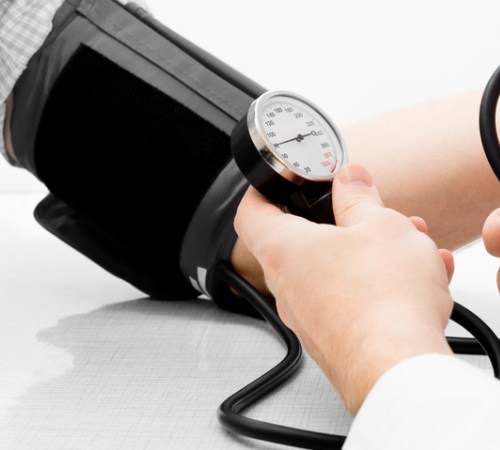
In addition, the doctor may appoint a doctor:
- Take an analysis of urine in order to exclude the renal infection.
- Drive blood for sugar.
- Drive blood for cholesterol.
Treatment of arterial hypertension
Treatment without the use of medicines is prescribed for each patient, since it significantly increases the result of drug therapy and reduces the need to use antihypertensive drugs.
As a rule, the patient is recommended to radically change his own lifestyle, refuse what he is used to:
- Do not smoke if a person smokes every day.
- Do not drink alcohol or reduce their dose. Men can drink no more than 30 ml per day, women - no more than 20 ml.
- Reduce the use of table salt. It is allowed to add no more than 5 g per day, you can less.
- Exclude drugs that contain a lot of potassium, magnesium and calcium. The listed components are used in large quantities to lower high pressure.
Basically, those drugs that operate throughout the day are used. In order to avoid side effects, the minimum dosage is prescribed for a start.
The main medications are divided into 6 groups. Among these drugs, the most effective are: beta-blocker and thiazide diuretic.
Recall that treatment with a drug (thiazid diuretic) should be started with a minimum dose. If there is no positive effect or the patient has intolerance to the medicine, then the smallest dosage of beta-blocker may be prescribed.
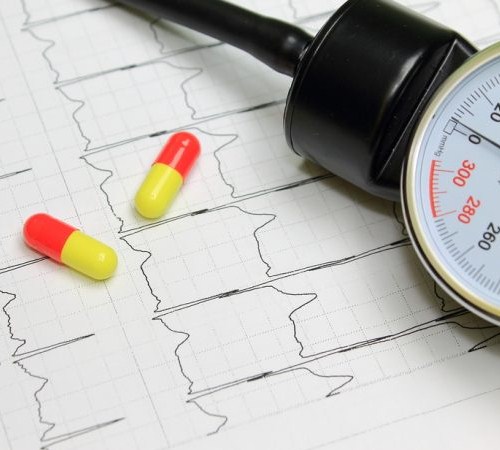
Tiazid diuretic is positioned as follows:
- A medicine that belongs to the first row. Used for therapy for the disease.
- The optimal dosage is considered less effective.
The beta-blocker is assigned to be accepted in the following cases:
- If arterial hypertension is accompanied by angina pectoris, after a myocardial infarction.
- With increased coronary risk.
The doctor can also appoint:
- Antitromobocyte therapy.
- The use of a hyalipidemic drug.
- Combined treatment with medicines.
Arterial hypertension: recommendations and prevention
In addition to the above recommendations, the doctor may strongly advise:
- A person with a large weight to lose extra pounds. To do this, it is advisable to make an appointment with a nutritionist so that it compiles a special balanced diet.
- Increase the number of physical training, regular exercises.
- Eat fruits and vegetables in large quantities, reduce the number of those products in which there are many fatty acids.
The diagnosis of arterial hypertension occurs for a reason. It is better to warn the disease than cure. Therefore, it is necessary to think about taking some preventive measures at a young age. This is important for those who have relatives in the family who complain of arterial hypertension.
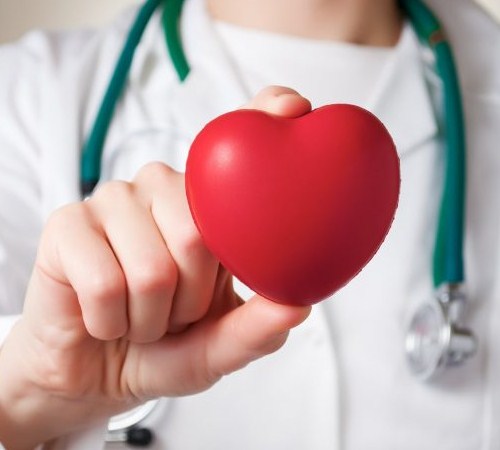
Arterial hypertension should be eliminated by factors that increase the risk of disease. First you need to eliminate bad habits, change everything in life. You can play sports, run, walk more, swim, sign up for aquaerobika.
These all manipulations significantly reduce the likelihood of developing arterial hypertension. Your heart will begin to get used to heavy loads over time, you will have better blood circulation, as a result of which the organs will begin to receive the right nutrition, metabolic processes will improve.
In addition, protect yourself from stressful situations. If this fails, then respond to stress skeptical. If possible, buy a device that will control your blood pressure and pulse. Periodically measure the pulse, since there are no symptoms during the initial stage. If you are more than 40 years old, then regularly visit the doctors: cardiologist and therapist.









Comments
a couple of years ago, there was no side of metrogils from the same problem, there were no side effects ...
I’m not a fan of peeling at all, it saves from acne of metrogil, it also smoothes it ...
Great article! ...
I take the second course of the Capsules Climafite 911. The tides went very quickly. It became calmer, irritability went away and I sleep well ...
i also noticed - it is worth nervous, everything immediately affects the face. Therefore, I try to avoid conflicts and unpleasant people. Of the creams, I like Miaflow from wrinkles - smoothes not only small wrinkles ...